|
|
|
Sort Order |
|
|
|
Items / Page
|
|
|
|
|
|
|
| Srl | Item |
| 1 |
ID:
142608
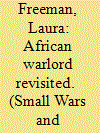

|
|
|
|
|
| Summary/Abstract |
To date, warlordism in Africa has been viewed solely negatively. This has come about, in part, because of the analytical lenses that have been used. Typically, warlordism has been examined at the state level; and behavioural traits, rather than definitionally necessary components, have been the focus. In effect, ‘warlord’ has been confused with other violent actors. I suggest here a reconceptualisation ‘from below’, which takes into account variation in types of warlordism, and which allows for both positive and negative effects of warlordism on society and the state.
|
|
|
|
|
|
|
|
|
|
|
|
|
|
|
|
| 2 |
ID:
065773
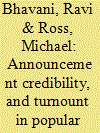

|
|
|
| 3 |
ID:
109140
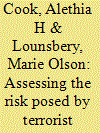

|
|
|
|
|
| Publication |
2011.
|
| Summary/Abstract |
While terrorist organizations have been analyzed for their motivations and tactics, little has been done to develop a systematic understanding of what makes some groups more dangerous than others. Knowing what makes some groups more threatening than others, or what conditions can influence a single group to become more or less of a threat, would help governments to prioritize resources during counterterrorism efforts. Using an approach similar to Ted Robert Gurr's assignment of a risk score to identify impending minority group rebellion, this article develops and tests a set of terrorist organizational characteristics. A two-phased approach is used. First, the authors identify key characteristics that could be anticipated to drive groups to be more active or deadly. The characteristics were identified and measured for terrorist groups for 1990-1994. The authors test group characteristics against subsequent group violence intensity from 1995 to 1999. Findings indicate that some group characteristics, such as religious ideology and group size, are important to understanding a group's relative level of violence. Though the study focused on a relatively short period of time, the findings indicate that a more comprehensive study of the impact that group characteristics have on violence levels would be a worthwhile undertaking.
|
|
|
|
|
|
|
|
|
|
|
|
|
|
|
|
| 4 |
ID:
143344
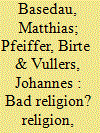

|
|
|
|
|
| Summary/Abstract |
Anecdotal evidence from many armed conflicts suggests that religion incites violence. Theoretically speaking, several facets of religion can create motives and opportunities to overcome the collective action problems associated with organized violence. However, empirical research has hitherto found no conclusive answer on the extent to which religion is connected to armed conflict onset. Contributing to the filling of this gap, we use a new database that incorporates important religious factors that previous studies left largely untested. The data set covers 130 developing countries for the period 1990 to 2010. Results from logistic regressions confirm our expectation that certain religious factors fuel armed conflict—in particular, the overlap of religious and other identities, religious groups’ grievances, and religious leaders’ calls for violence. We also find that religious determinants vary in their impact according to whether conflicts are religious or not in origin.
|
|
|
|
|
|
|
|
|
|
|
|
|
|
|
|
| 5 |
ID:
091683
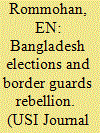

|
|
|
| 6 |
ID:
190755


|
|
|
|
|
| Summary/Abstract |
Why do individuals engage in violence against the state? This research investigates the biological and environmental determinants of individual-level participation in political violence through the use of a Candidate Gene Association, gene-environment interaction, study. Existing research has demonstrated that variation in a specific gene (called MAO-A) is associated with aggression. However, relatively little scholarly attention has been paid to the interaction with the environment; specifically, the ways in which repressive political environments differentially incite acts of violence. Using original genetic, survey and experimental data collected on participants and non-participants of political violence, I find that under conditions of political repression, individuals with the low MAO-A genetic variant are significantly more likely to engage in acts of political violence. By examining both the genetic and environmental factors influencing political violence, the results make a significant contribution to our understanding of how genetic variation may lead to violence.
|
|
|
|
|
|
|
|
|
|
|
|
|
|
|
|
| 7 |
ID:
124983
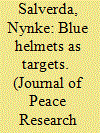

|
|
|
|
|
| Publication |
2013.
|
| Summary/Abstract |
A majority of UN peacekeeping operations deployed to civil wars face violent attacks by rebel groups. To date, the academic study of this type of violence has been very limited. This article is a first attempt to fill this gap. In particular, I aim to examine why rebel groups fight against peacekeepers in some cases, while not in others. I argue that since peacekeepers are mostly impartial but not neutral, they become an actor in a conflict and tend to protect the weaker side from total defeat. This implies that on the one hand, relatively weaker rebels will seek protection from the government by peacekeepers. On the other hand, relatively stronger rebels will challenge the peacekeepers in order to restrict their behavior and/or make them withdraw. If stronger rebels are successful in targeting the peacekeepers and the peacekeepers withdraw or alter their behavior, a victory for these rebel groups should become easier. Using novel data on violence against UN peacekeepers, I find that indeed, stronger rebel groups are more likely to fight against peacekeepers.
|
|
|
|
|
|
|
|
|
|
|
|
|
|
|
|
| 8 |
ID:
098346
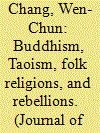

|
|
|
|
|
| Publication |
2010.
|
| Summary/Abstract |
This study investigates the influences of religion in determining whether to support what might be perceived to be rebellious actions in Taiwan where most people are adherents of Buddhism, Taoism, and folk religions. Using data from the Taiwan Social Change Survey 2004, the estimations of the probit model suggest that there are some strong links between religion and the attitudes toward rebellious actions. In particular, being a Taoist reduces the probability of protest participation while being a Buddhist and being a folk religionist cut the likelihood of signing a petition. Moreover, the frequencies of religious attendance are positively associated with the probabilities of participating in a protest, signing a petition, and taking actions against injustice or harmful regulations.
|
|
|
|
|
|
|
|
|
|
|
|
|
|
|
|
| 9 |
ID:
151151


|
|
|
|
|
| Summary/Abstract |
Despite the prevalence of nonviolent uprisings in recent history, no existing scholarship has produced a generalized explanation of when and where such uprisings are most likely to occur. Our primary aim in this article is to evaluate whether different available models—namely, grievance approaches, modernization theory, resource mobilization theory, and political opportunity approaches—are useful in explaining the onset of major nonviolent uprisings. We assemble a reduced list of correlates based on each model and use each model’s out-of-sample area under the curve and logarithmic score to test each theory’s explanatory power. We find that the political opportunity model performs best for both in- and out-of-sample cases, though grievance and resource mobilization approaches also provide some explanatory power. We use a culled model of the predicted probabilities of the strongest-performing variables from all models to forecast major nonviolent uprisings in 2011 and 2012. In this out-of-sample test, all models produce mixed results, suggesting greater emphasis on agency over structure in explaining these episodes.
|
|
|
|
|
|
|
|
|
|
|
|
|
|
|
|
| 10 |
ID:
185760


|
|
|
|
|
| Summary/Abstract |
On April 20, 2021, as he was preparing to commence his sixth term in office, it was officially announced that Chadian President Idriss Déby Itno had died on the battlefield. He was immediately and unconstitutionally replaced by his son, General Mahamat Idriss Déby, at the head of a fourteen-strong transitional military council, to great international acclaim. This contribution attempts to spell out what this series of events and Déby’s career can tell us about current Chadian politics and the nature of the Chadian state more generally.
|
|
|
|
|
|
|
|
|
|
|
|
|
|
|
|
| 11 |
ID:
186808
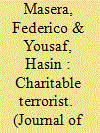

|
|
|
|
|
| Summary/Abstract |
Violent organizations are often providers of many social services in competition with the state. We provide evidence that these organizations use the provision of social services to gain support. This strategy is only effective when it fills the void left by a weak state. We show this by studying the provision of natural disaster relief by the Pakistani state and the Taliban. We first analyze the floods of 2010 that received an inadequate response from the government and show that support for the Taliban increased in the areas affected by the flood. These effects were concentrated in places where the Taliban likely provided help and where the state under-delivered. We then study the 2005 earthquake that instead received a swift government response and show that the Taliban lost support in the affected areas. Results cannot be explained by alternate mechanisms as anger against incumbents, political competition, electoral participation, and religiosity.
|
|
|
|
|
|
|
|
|
|
|
|
|
|
|
|
| 12 |
ID:
053529


|
|
|
|
|
| Edition |
2nd ed.
|
| Publication |
Westport, Praeger Publishers, 2004.
|
| Description |
xvii, 316p.pbk
|
| Standard Number |
0275974766
|
|
|
|
|
|
|
|
|
|
|
|
Copies: C:1/I:0,R:0,Q:0
Circulation
| Accession# | Call# | Current Location | Status | Policy | Location |
| 048544 | 951/SCH 048544 | Main | On Shelf | General | |
|
|
|
|
| 13 |
ID:
157233
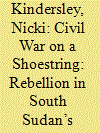

|
|
|
|
|
| Summary/Abstract |
This article is a case study of armed opposition factions in the Central Equatoria region within South Sudan’s current civil war. Based on research in South Sudan and northern Uganda during the spring of 2017, the study focuses on the internal organisation, recruitment and funding processes, and political ideas of these organisations, engaging with recent theories concerning governance and civilians in rebel-controlled territories. It argues that rebels and civilians are not separate analytical categories, and that the region’s new wartime orders are embedded in common local knowledge drawn from historical practice.
|
|
|
|
|
|
|
|
|
|
|
|
|
|
|
|
| 14 |
ID:
144445


|
|
|
|
|
| Summary/Abstract |
Regardless of the outcome, civil wars are destructive events. They not only devastate the physical and human capital of a society, but also have a direct effect on state capacity. The capacity of the state is critical as it attempts to rebuild society and minimize the risk of a new civil conflict; yet, it is still not clear how civil war precisely affects state capacity. In general, we argue that incumbent victors are more likely to end with a stronger state when the conflict is short and the victory is decisive. In contrast, rebel victors require more time to build their internal capacity and thus have stronger states after a longer conflict, especially when they had access to lootable resources.
|
|
|
|
|
|
|
|
|
|
|
|
|
|
|
|
| 15 |
ID:
172335
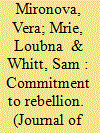

|
|
|
|
|
| Summary/Abstract |
What sustains commitment to rebel fighting during civil war? Using original survey data from the ongoing conflict in Syria, we examine whether self-ascribed rebel fighters, former fighters, civilians, and refugees can be clearly differentiated based on commitment to rebellion. We ask whether such groups are better characterized as a broadly holistic fighting community or a heterogeneous mix of actors with different levels of support for violence. Using a well-balanced sample of over 300 active and former rebel fighters, civilians from within the conflict zone, and externally displaced refugees, we observe that fighting commitment is greater among active combatants compared to other cohorts. To understand why, we examine underexplored psychological mechanisms and find that individuals with higher risk tolerance, optimism bias, and identity fusion with rebel forces display greater dedication to fighting. We discuss the implications of our results for understanding who participates in civil war violence and why.
|
|
|
|
|
|
|
|
|
|
|
|
|
|
|
|
| 16 |
ID:
128979


|
|
|
|
|
| Publication |
2014.
|
| Summary/Abstract |
Civil conflict appears to be contagious-scholars have shown that civil wars in a state's neighborhood make citizens more likely to rebel at home. However, war occurs when both rebels and the state engage in conflict. How do state authorities respond to the potential for civil conflict to spread? We argue that elites will anticipate the incentive-altering effects of civil wars abroad and increase repression at home to preempt potential rebellion. Using a Bayesian hierarchical model and spatially weighted conflict measures, we find robust evidence that a state will engage in higher levels of human rights violations as civil war becomes more prevalent in its geographic proximity. We thus find evidence that states violate rights as a function of the internal politics of other states. Further, we argue authorities will act not to mimic their neighbors but rather to avoid their fate.
|
|
|
|
|
|
|
|
|
|
|
|
|
|
|
|
| 17 |
ID:
078685
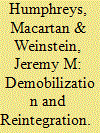

|
|
|
|
|
| Publication |
2007.
|
| Summary/Abstract |
Since 1989, international efforts to end protracted conflicts have included sustained investments in the disarmament, demobilization, and reintegration (DDR) of combatants. Yet while policy analysts have debated the factors that contribute to successful DDR programs and scholars have reasoned about the macro conditions that facilitate successful peace building, little is known about the factors that account for successful reintegration at the micro level. Using a new dataset of ex-combatants in Sierra Leone, this article analyzes the individual-level determinants of demobilization and reintegration. Past participation in an abusive military faction is the strongest predictor of difficulty in achieving social reintegration. On economic and political reintegration, we find that wealthier and more educated combatants face greater difficulties. Ideologues, men, and younger fighters are the most likely to retain strong ties to their factions. Most important, we find little evidence at the micro level that internationally funded programs facilitate demobilization and reintegration
|
|
|
|
|
|
|
|
|
|
|
|
|
|
|
|
| 18 |
ID:
107903
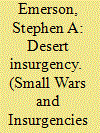

|
|
|
|
|
| Publication |
2011.
|
| Summary/Abstract |
This article provides an in-depth examination and analysis of the 2006-2009 Tuareg rebellion in Mali and Niger. It identifies the underlying reasons behind the rebellion, explores contrasting counter-insurgency (COIN) strategies employed by the two governments, and presents some lessons learned. While both COIN approaches ultimately produced similar peace settlements, the article argues that the Malian strategy of reconciliation combined with the selective use of force was far more effective than the Nigerien iron fist approach at limiting the size and scope of the insurgency and producing a more sustainable peace. It concludes by looking at the role of external actors, particularly the United States, and how the failure to internationalize the conflict was actually more beneficial to the local COIN effort, as well as to the longer strategic interests of the United States in the region.
|
|
|
|
|
|
|
|
|
|
|
|
|
|
|
|
| 19 |
ID:
106272
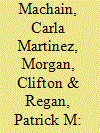

|
|
|
|
|
| Publication |
2011.
|
| Summary/Abstract |
Global terrorism and local rebellion are observed rather frequently; solutions appear to be rather sparse. A common strategy adopted by governments is to attempt to deter potential rebels from engaging in acts of violence, often by responding to attacks with violent reprisals directed at the populace from which the rebels are recruited. The logic supporting such a strategy follows from a theory of deterrence that we believe is underdeveloped. This theory focuses heavily on the credibility of the deterrent threat and on ensuring that the cost imposed by retaliation is high. This ignores the flip side of the deterrent threat-that is, the promise that if one does not misbehave (by engaging in acts of rebellion), one will not suffer retaliatory punishment. Policy designed to ensure that punishment is swift and severe (and perhaps disproportional) can undermine deterrence and actually encourage more potential rebels to become active. Using a game-theoretic model, we show that successful deterrence requires a strategy in which retaliation is proportionate and directed only at the guilty, as well as being certain. Moreover, potential rebels must believe that the innocent will have attractive opportunities outside of joining the insurgency as well as that the innocent will not be punished. We provide empirical illustrations of our thesis from participants in the Palestinian uprising, including several who have taken up arms against Israel.
|
|
|
|
|
|
|
|
|
|
|
|
|
|
|
|
| 20 |
ID:
093604
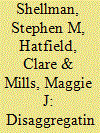

|
|
|
|
|
| Publication |
2010.
|
| Summary/Abstract |
While some of the intrastate war literature calls for the disaggregation of civil conflict, most of those studies focus on the geography of civil conflict failing to take into account the various actors involved in such conflicts. This study addresses the multi-actor nature of civil conflict by examining whether 'actor aggregation' affects the inferences drawn from quantitative studies of civil conflict. Using two cases, Cambodia (1980-2004) and Indonesia (1980-2004), the authors examine how multiple dissident groups' behavior aggregated together can affect the inferences drawn from quantitative studies of government-dissident interactions. The results demonstrate that researchers may draw different inferences and commit both Type I and Type II errors using different actor aggregations. The results have myriad implications for the study of civil conflict and conflict processes.
|
|
|
|
|
|
|
|
|
|
|
|
|
|
|
|
|
|
|
|
|